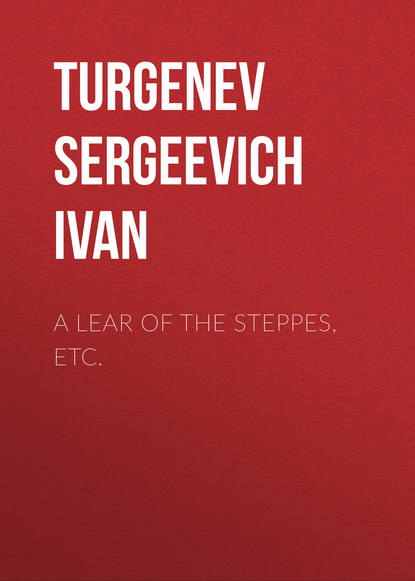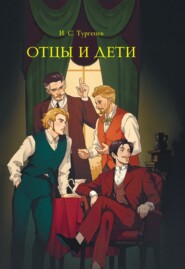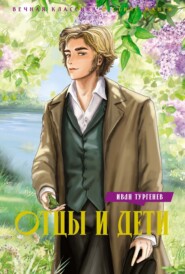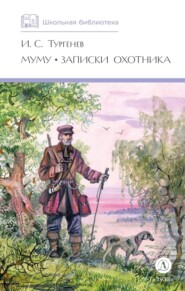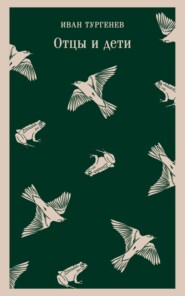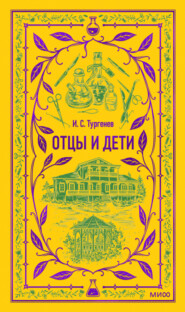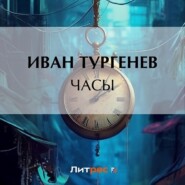По всем вопросам обращайтесь на: info@litportal.ru
(©) 2003-2025.
✖
A Lear of the Steppes, etc.
Настройки чтения
Размер шрифта
Высота строк
Поля
‘And if we had a ladder,’ one voice pronounced deliberately, ‘who’d care to climb up? Not such fools! He’d wring your neck for you – in a twinkling!’
‘He’d kill one in no time,’ said one young lad with flaxen hair and a half-idiotic face.
‘To be sure he would,’ the others confirmed. It struck me that, even if there had been no obvious danger, the peasants would yet have been loath to carry out their new owner’s orders. They almost approved of Harlov, though they were amazed at him.
‘Ugh, you robbers!’ moaned Sletkin; ‘you shall all catch it…’
But at this moment, with a heavy rumble, the last chimney came crashing down, and, in the midst of the cloud of yellow dust that flew up instantly, Harlov – uttering a piercing shriek and lifting his bleeding hands high in the air – turned facing us. Sletkin pointed the gun at him again.
Evlampia pulled him back by the elbow.
‘Don’t interfere!’ he snarled savagely at her.
‘And you – don’t you dare!’ she answered; and her blue eyes flashed menacingly under her scowling brows. ‘Father’s pulling his house down. It’s his own.’
‘You lie: it’s ours!’
‘You say ours; but I say it’s his.’
Sletkin hissed with fury; Evlampia’s eyes seemed stabbing him in the face.
‘Ah, how d’ye do! my delightful daughter!’ Harlov thundered from above. ‘How d’ye do! Evlampia Martinovna! How are you getting on with your sweetheart? Are your kisses sweet, and your fondling?’
‘Father!’ rang out Evlampia’s musical voice.
‘Eh, daughter?’ answered Harlov; and he came down to the very edge of the wall. His face, as far as I could make it out, wore a strange smile, a bright, mirthful – and for that very reason peculiarly strange and evil – smile… Many years later I saw just the same smile on the face of a man condemned to death.
‘Stop, father; come down. We are in fault; we give everything back to you. Come down.’
‘What do you mean by disposing of what’s ours?’ put in Sletkin. Evlampia merely scowled more angrily.
‘I give you back my share. I give up everything. Give over, come down, father! Forgive us; forgive me.’
Harlov still went on smiling. ‘It’s too late, my darling,’ he said, and each of his words rang out like brass. ‘Too late your stony heart is touched! The rock’s started rolling downhill – there’s no holding it back now! And don’t look to me now; I’m a doomed man! You’d do better to look to your Volodka; see what a pretty fellow you’ve picked out! And look to your hellish sister; there’s her foxy nose yonder thrust out of the window; she’s peering yonder after that husband of hers! No, my good friends; you would rob me of a roof over my head, so I will leave you not one beam upon another! With my own hands I built it, with my own hands I destroy it, – yes, with my hands alone! See, I’ve taken no axe to help me!’
He snorted at his two open hands, and clutched at the centre beam again.
‘Enough, father,’ Evlampia was saying meanwhile, and her voice had grown marvellously caressing, ‘let bygones be bygones. Come, trust me; you always trusted me. Come, get down; come to me to my little room, to my soft bed. I will dry you and warm you; I will bind up your wounds; see, you have torn your hands. You shall live with me as in Christ’s bosom; food shall be sweet to you – and sleep sweeter yet. Come, we have done wrong! yes, we were puffed up, we have sinned; come, forgive!’
Harlov shook his head. ‘Talk away! Me believe you! Never again! You’ve murdered all trust in my heart! You’ve murdered everything! I was an eagle, and became a worm for you … and you, – would you even crush the worm? Have done! I loved you, you know very well, – but now you are no daughter to me, and I’m no father to you … I’m a doomed man! Don’t meddle! As for you, fire away, coward, mighty man of valour!’ Harlov bellowed suddenly at Sletkin. ‘Why is it you keep aiming and don’t shoot? Are you mindful of the law; if the recipient of a gift commits an attempt upon the life of the giver,’ Harlov enunciated distinctly, ‘then the giver is empowered to claim everything back again? Ha, ha! don’t be afraid, law-abiding man! I’d make no claims. I’ll make an end of everything myself… Here goes!’
‘Father!’ for the last time Evlampia besought him.
‘Silence!’
‘Martin Petrovitch! brother, be generous and forgive!’ faltered Souvenir.
‘Father! dear father!’
‘Silence, bitch!’ shouted Harlov. At Souvenir he did not even glance, – he merely spat in his direction.
XXVII
At that instant, Kvitsinsky, with all his retinue – in three carts – appeared at the gates. The tired horses panted, the men jumped out, one after another, into the mud.
‘Aha!’ Harlov shouted at the top of his voice. ‘An army … here it comes, an army! A whole army they’re sending against me! Capital! Only I give warning – if any one comes up here to me on the roof, I’ll send him flying down, head over heels! I’m an inhospitable master; I don’t like visitors at wrong times! No indeed!’
He was hanging with both hands on to the front rafters of the roof, the so-called standards of the gable, and beginning to shake them violently. Balancing on the edge of the garret flooring, he dragged them, as it were, after him, chanting rhythmically like a bargeman, ‘One more pull! one more! o-oh!’
Sletkin ran up to Kvitsinsky and was beginning to whimper and pour out complaints… The latter begged him ‘not to interfere,’ and proceeded to carry out the plan he had evolved. He took up his position in front of the house, and began, by way of diversion, to explain to Harlov that what he was about was unworthy of his rank…
‘One more pull! one more!’ chanted Harlov.
… ‘That Natalia Nikolaevna was greatly displeased at his proceedings, and had not expected it of him…’
‘One more pull! one more! o-oh!’ Harlov chanted … while, meantime, Kvitsinsky had despatched the four sturdiest and boldest of the stable-boys to the other side of the house to clamber up the roof from behind. Harlov, however, detected the plan of attack; he suddenly left the standards and ran quickly to the back part of the roof. His appearance was so alarming that the two stable-boys who had already got up to the garret, dropped instantly back again to the ground by the water-pipe, to the great glee of the serf boys, who positively roared with laughter. Harlov shook his fist after them and, going back to the front part of the house, again clutched at the standards and began once more loosening them, singing again, like a bargeman.
Suddenly he stopped, stared…
‘Maximushka, my dear! my friend!’ he cried; ‘is it you?’
I looked round… There, actually, was Maximka, stepping out from the crowd of peasants. Grinning and showing his teeth, he walked forward. His master, the tailor, had probably let him come home for a holiday.
‘Climb up to me, Maximushka, my faithful servant,’ Harlov went on; ‘together let us rid ourselves of evil Tartar folk, of Lithuanian thieves!’
Maximka, still grinning, promptly began climbing up the roof… But they seized him and pulled him back – goodness knows why; possibly as an example to the rest; he could hardly have been much aid to Martin Petrovitch.
‘Oh, all right! Good!’ Harlov pronounced, in a voice of menace, and again he took hold of the standards.
‘Vikenty Osipovitch! with your permission, I’ll shoot,’ Sletkin turned to Kvitsinsky; ‘more to frighten him, see, than anything; my gun’s only charged with snipe-shot.’ But Kvitsinsky had not time to answer him, when the front couple of standards, viciously shaken in Harlov’s iron hands, heeled over with a loud crack and crashed into the yard; and with it, not able to stop himself, came Harlov too, and fell with a heavy thud on the earth. Every one shuddered and drew a deep breath… Harlov lay without stirring on his breast, and on his back lay the top central beam of the roof, which had come down with the falling gable’s timbers.
XXVIII
They ran up to Harlov, rolled the beam off him, turned him over on his back. His face was lifeless, there was blood about his mouth; he did not seem to breathe. ‘The breath is gone out of him,’ muttered the peasants, standing about him. They ran to the well for water, brought a whole bucketful, and drenched Harlov’s head. The mud and dust ran off his face, but he looked as lifeless as ever. They dragged up a bench, set it in the house itself, and with difficulty raising the huge body of Martin Petrovitch, laid it there with the head to the wall. The page Maximka approached, fell on one knee, and, his other leg stretched far behind him, in a theatrical way, supported his former master’s arm. Evlampia, pale as death, stood directly facing her father, her great eyes fastened immovably upon him. Anna and Sletkin did not come near him. All were silent, all, as it were, waited for something. At last we heard broken, smacking noises in Harlov’s throat, as though he were swallowing… Then he feebly moved one, his right, hand (Maximka supported the left), opened one, the right eye, and slowly gazing about him, as though drunken with some fearful drunkenness, groaned, articulated, stammering, ‘I’m sma-ashed …’ and as though after a moment’s thought, added, ‘here it is, the ra … aven co … olt!’ The blood suddenly gushed thickly from his mouth … his whole body began to quiver…
‘The end!’ I thought… But once more Harlov opened the same eye (the left eyelid lay as motionless as on a dead man’s face), and fixing it on Evlampia, he articulated, hardly above a breath, ‘Well, daugh … ter … you, I do not…’
Kvitsinsky, with a sharp motion of his hand, beckoned to the priest, who was still standing on the step… The old man came up, his narrow cassock clinging about his feeble knees. But suddenly there was a sort of horrible twitching in Harlov’s legs and in his stomach too; an irregular contraction passed upwards over his face. Evlampia’s face seemed quivering and working in the same way. Maximka began crossing himself… I was seized with horror; I ran out to the gates, squeezed myself close to them, not looking round. A minute later a soft murmur ran through the crowd, behind my back, and I understood that Martin Petrovitch was no more.
His skull had been fractured by the beam and his ribs injured, as it appeared at the post-mortem examination.
XXIX
What had he wanted to say to her as he lay dying? I asked myself as I went home on my cob: ‘I do not … forgive,’ or ‘do not … pardon.’ The rain had come on again, but I rode at a walking pace. I wanted to be alone as long as possible; I wanted to give myself up to my reflections, unchecked. Souvenir had gone back in one of the carts that had come with Kvitsinsky. Young and frivolous as I was at that time, the sudden sweeping change (not in mere details only) that is invariably called forth in all hearts by the coming of death – expected or unexpected, it makes no difference! – its majesty, its gravity, and its truthfulness could not fail to impress me. I was impressed too, … but for all that, my troubled, childish eyes noted many things at once; they noted how Sletkin, hurriedly and furtively, as though it were something stolen, popped the gun out of sight; how he and his wife became, both of them, instantly the object of a sort of unspoken but universal aloofness. To Evlampia, though her fault was probably no less than her sister’s, this aloofness did not extend. She even aroused a certain sympathy, when she fell at her dead father’s feet. But that she too was guilty, that was none the less felt by all. ‘The old man was wronged,’ said a grey-haired peasant with a big head, leaning, like some ancient judge, with both hands and his beard on a long staff; ‘on your soul lies the sin! You wronged him!’ That saying was at once accepted by every one as the final judgment. The peasants’ sense of justice found expression in it, I felt that at once. I noticed too that, at the first, Sletkin did not dare to give directions. Without him, they lifted up the body and carried it into the other house. Without asking him, the priest went for everything needful to the church, while the village elder ran to the village to send off a cart and horse to the town. Even Anna Martinovna did not venture to use her ordinary imperious tone in ordering the samovar to be brought, ‘for hot water, to wash the deceased.’ Her orders were more like an entreaty, and she was answered rudely…
I was absorbed all the while by the question, What was it exactly he wanted to say to his daughter? Did he want to forgive her or to curse her? Finally I decided that it was – forgiveness.
Three days later, the funeral of Martin Petrovitch took place. The cost of the ceremony was undertaken by my mother, who was deeply grieved at his death, and gave orders that no expense was to be spared. She did not herself go to the church, because she was unwilling, as she said, to set eyes on those two vile hussies and that nasty little Jew. But she sent Kvitsinsky, me, and Zhitkov, though from that time forward she always spoke of the latter as a regular old woman. Souvenir she did not admit to her presence, and was furious with him for long after, saying that he was the murderer of her friend. He felt his disgrace acutely; he was continually running, on tiptoe, up and down the room, next to the one where my mother was; he gave himself up to a sort of scared and abject melancholy, shuddering and muttering, ‘d’rectly!’
‘He’d kill one in no time,’ said one young lad with flaxen hair and a half-idiotic face.
‘To be sure he would,’ the others confirmed. It struck me that, even if there had been no obvious danger, the peasants would yet have been loath to carry out their new owner’s orders. They almost approved of Harlov, though they were amazed at him.
‘Ugh, you robbers!’ moaned Sletkin; ‘you shall all catch it…’
But at this moment, with a heavy rumble, the last chimney came crashing down, and, in the midst of the cloud of yellow dust that flew up instantly, Harlov – uttering a piercing shriek and lifting his bleeding hands high in the air – turned facing us. Sletkin pointed the gun at him again.
Evlampia pulled him back by the elbow.
‘Don’t interfere!’ he snarled savagely at her.
‘And you – don’t you dare!’ she answered; and her blue eyes flashed menacingly under her scowling brows. ‘Father’s pulling his house down. It’s his own.’
‘You lie: it’s ours!’
‘You say ours; but I say it’s his.’
Sletkin hissed with fury; Evlampia’s eyes seemed stabbing him in the face.
‘Ah, how d’ye do! my delightful daughter!’ Harlov thundered from above. ‘How d’ye do! Evlampia Martinovna! How are you getting on with your sweetheart? Are your kisses sweet, and your fondling?’
‘Father!’ rang out Evlampia’s musical voice.
‘Eh, daughter?’ answered Harlov; and he came down to the very edge of the wall. His face, as far as I could make it out, wore a strange smile, a bright, mirthful – and for that very reason peculiarly strange and evil – smile… Many years later I saw just the same smile on the face of a man condemned to death.
‘Stop, father; come down. We are in fault; we give everything back to you. Come down.’
‘What do you mean by disposing of what’s ours?’ put in Sletkin. Evlampia merely scowled more angrily.
‘I give you back my share. I give up everything. Give over, come down, father! Forgive us; forgive me.’
Harlov still went on smiling. ‘It’s too late, my darling,’ he said, and each of his words rang out like brass. ‘Too late your stony heart is touched! The rock’s started rolling downhill – there’s no holding it back now! And don’t look to me now; I’m a doomed man! You’d do better to look to your Volodka; see what a pretty fellow you’ve picked out! And look to your hellish sister; there’s her foxy nose yonder thrust out of the window; she’s peering yonder after that husband of hers! No, my good friends; you would rob me of a roof over my head, so I will leave you not one beam upon another! With my own hands I built it, with my own hands I destroy it, – yes, with my hands alone! See, I’ve taken no axe to help me!’
He snorted at his two open hands, and clutched at the centre beam again.
‘Enough, father,’ Evlampia was saying meanwhile, and her voice had grown marvellously caressing, ‘let bygones be bygones. Come, trust me; you always trusted me. Come, get down; come to me to my little room, to my soft bed. I will dry you and warm you; I will bind up your wounds; see, you have torn your hands. You shall live with me as in Christ’s bosom; food shall be sweet to you – and sleep sweeter yet. Come, we have done wrong! yes, we were puffed up, we have sinned; come, forgive!’
Harlov shook his head. ‘Talk away! Me believe you! Never again! You’ve murdered all trust in my heart! You’ve murdered everything! I was an eagle, and became a worm for you … and you, – would you even crush the worm? Have done! I loved you, you know very well, – but now you are no daughter to me, and I’m no father to you … I’m a doomed man! Don’t meddle! As for you, fire away, coward, mighty man of valour!’ Harlov bellowed suddenly at Sletkin. ‘Why is it you keep aiming and don’t shoot? Are you mindful of the law; if the recipient of a gift commits an attempt upon the life of the giver,’ Harlov enunciated distinctly, ‘then the giver is empowered to claim everything back again? Ha, ha! don’t be afraid, law-abiding man! I’d make no claims. I’ll make an end of everything myself… Here goes!’
‘Father!’ for the last time Evlampia besought him.
‘Silence!’
‘Martin Petrovitch! brother, be generous and forgive!’ faltered Souvenir.
‘Father! dear father!’
‘Silence, bitch!’ shouted Harlov. At Souvenir he did not even glance, – he merely spat in his direction.
XXVII
At that instant, Kvitsinsky, with all his retinue – in three carts – appeared at the gates. The tired horses panted, the men jumped out, one after another, into the mud.
‘Aha!’ Harlov shouted at the top of his voice. ‘An army … here it comes, an army! A whole army they’re sending against me! Capital! Only I give warning – if any one comes up here to me on the roof, I’ll send him flying down, head over heels! I’m an inhospitable master; I don’t like visitors at wrong times! No indeed!’
He was hanging with both hands on to the front rafters of the roof, the so-called standards of the gable, and beginning to shake them violently. Balancing on the edge of the garret flooring, he dragged them, as it were, after him, chanting rhythmically like a bargeman, ‘One more pull! one more! o-oh!’
Sletkin ran up to Kvitsinsky and was beginning to whimper and pour out complaints… The latter begged him ‘not to interfere,’ and proceeded to carry out the plan he had evolved. He took up his position in front of the house, and began, by way of diversion, to explain to Harlov that what he was about was unworthy of his rank…
‘One more pull! one more!’ chanted Harlov.
… ‘That Natalia Nikolaevna was greatly displeased at his proceedings, and had not expected it of him…’
‘One more pull! one more! o-oh!’ Harlov chanted … while, meantime, Kvitsinsky had despatched the four sturdiest and boldest of the stable-boys to the other side of the house to clamber up the roof from behind. Harlov, however, detected the plan of attack; he suddenly left the standards and ran quickly to the back part of the roof. His appearance was so alarming that the two stable-boys who had already got up to the garret, dropped instantly back again to the ground by the water-pipe, to the great glee of the serf boys, who positively roared with laughter. Harlov shook his fist after them and, going back to the front part of the house, again clutched at the standards and began once more loosening them, singing again, like a bargeman.
Suddenly he stopped, stared…
‘Maximushka, my dear! my friend!’ he cried; ‘is it you?’
I looked round… There, actually, was Maximka, stepping out from the crowd of peasants. Grinning and showing his teeth, he walked forward. His master, the tailor, had probably let him come home for a holiday.
‘Climb up to me, Maximushka, my faithful servant,’ Harlov went on; ‘together let us rid ourselves of evil Tartar folk, of Lithuanian thieves!’
Maximka, still grinning, promptly began climbing up the roof… But they seized him and pulled him back – goodness knows why; possibly as an example to the rest; he could hardly have been much aid to Martin Petrovitch.
‘Oh, all right! Good!’ Harlov pronounced, in a voice of menace, and again he took hold of the standards.
‘Vikenty Osipovitch! with your permission, I’ll shoot,’ Sletkin turned to Kvitsinsky; ‘more to frighten him, see, than anything; my gun’s only charged with snipe-shot.’ But Kvitsinsky had not time to answer him, when the front couple of standards, viciously shaken in Harlov’s iron hands, heeled over with a loud crack and crashed into the yard; and with it, not able to stop himself, came Harlov too, and fell with a heavy thud on the earth. Every one shuddered and drew a deep breath… Harlov lay without stirring on his breast, and on his back lay the top central beam of the roof, which had come down with the falling gable’s timbers.
XXVIII
They ran up to Harlov, rolled the beam off him, turned him over on his back. His face was lifeless, there was blood about his mouth; he did not seem to breathe. ‘The breath is gone out of him,’ muttered the peasants, standing about him. They ran to the well for water, brought a whole bucketful, and drenched Harlov’s head. The mud and dust ran off his face, but he looked as lifeless as ever. They dragged up a bench, set it in the house itself, and with difficulty raising the huge body of Martin Petrovitch, laid it there with the head to the wall. The page Maximka approached, fell on one knee, and, his other leg stretched far behind him, in a theatrical way, supported his former master’s arm. Evlampia, pale as death, stood directly facing her father, her great eyes fastened immovably upon him. Anna and Sletkin did not come near him. All were silent, all, as it were, waited for something. At last we heard broken, smacking noises in Harlov’s throat, as though he were swallowing… Then he feebly moved one, his right, hand (Maximka supported the left), opened one, the right eye, and slowly gazing about him, as though drunken with some fearful drunkenness, groaned, articulated, stammering, ‘I’m sma-ashed …’ and as though after a moment’s thought, added, ‘here it is, the ra … aven co … olt!’ The blood suddenly gushed thickly from his mouth … his whole body began to quiver…
‘The end!’ I thought… But once more Harlov opened the same eye (the left eyelid lay as motionless as on a dead man’s face), and fixing it on Evlampia, he articulated, hardly above a breath, ‘Well, daugh … ter … you, I do not…’
Kvitsinsky, with a sharp motion of his hand, beckoned to the priest, who was still standing on the step… The old man came up, his narrow cassock clinging about his feeble knees. But suddenly there was a sort of horrible twitching in Harlov’s legs and in his stomach too; an irregular contraction passed upwards over his face. Evlampia’s face seemed quivering and working in the same way. Maximka began crossing himself… I was seized with horror; I ran out to the gates, squeezed myself close to them, not looking round. A minute later a soft murmur ran through the crowd, behind my back, and I understood that Martin Petrovitch was no more.
His skull had been fractured by the beam and his ribs injured, as it appeared at the post-mortem examination.
XXIX
What had he wanted to say to her as he lay dying? I asked myself as I went home on my cob: ‘I do not … forgive,’ or ‘do not … pardon.’ The rain had come on again, but I rode at a walking pace. I wanted to be alone as long as possible; I wanted to give myself up to my reflections, unchecked. Souvenir had gone back in one of the carts that had come with Kvitsinsky. Young and frivolous as I was at that time, the sudden sweeping change (not in mere details only) that is invariably called forth in all hearts by the coming of death – expected or unexpected, it makes no difference! – its majesty, its gravity, and its truthfulness could not fail to impress me. I was impressed too, … but for all that, my troubled, childish eyes noted many things at once; they noted how Sletkin, hurriedly and furtively, as though it were something stolen, popped the gun out of sight; how he and his wife became, both of them, instantly the object of a sort of unspoken but universal aloofness. To Evlampia, though her fault was probably no less than her sister’s, this aloofness did not extend. She even aroused a certain sympathy, when she fell at her dead father’s feet. But that she too was guilty, that was none the less felt by all. ‘The old man was wronged,’ said a grey-haired peasant with a big head, leaning, like some ancient judge, with both hands and his beard on a long staff; ‘on your soul lies the sin! You wronged him!’ That saying was at once accepted by every one as the final judgment. The peasants’ sense of justice found expression in it, I felt that at once. I noticed too that, at the first, Sletkin did not dare to give directions. Without him, they lifted up the body and carried it into the other house. Without asking him, the priest went for everything needful to the church, while the village elder ran to the village to send off a cart and horse to the town. Even Anna Martinovna did not venture to use her ordinary imperious tone in ordering the samovar to be brought, ‘for hot water, to wash the deceased.’ Her orders were more like an entreaty, and she was answered rudely…
I was absorbed all the while by the question, What was it exactly he wanted to say to his daughter? Did he want to forgive her or to curse her? Finally I decided that it was – forgiveness.
Three days later, the funeral of Martin Petrovitch took place. The cost of the ceremony was undertaken by my mother, who was deeply grieved at his death, and gave orders that no expense was to be spared. She did not herself go to the church, because she was unwilling, as she said, to set eyes on those two vile hussies and that nasty little Jew. But she sent Kvitsinsky, me, and Zhitkov, though from that time forward she always spoke of the latter as a regular old woman. Souvenir she did not admit to her presence, and was furious with him for long after, saying that he was the murderer of her friend. He felt his disgrace acutely; he was continually running, on tiptoe, up and down the room, next to the one where my mother was; he gave himself up to a sort of scared and abject melancholy, shuddering and muttering, ‘d’rectly!’





